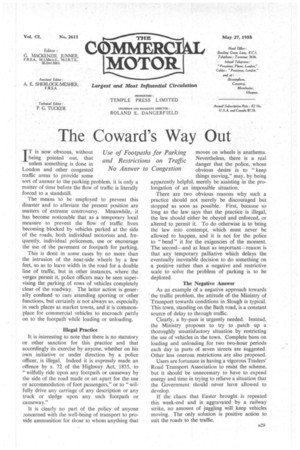The Coward's Way Out
Page 37

If you've noticed an error in this article please click here to report it so we can fix it.
IT is now obvious, without being pointed out, that unless something is done in London and other congested traffic areas to provide some sort of answer to the parking problem, it is MY a matter of time before tile flow of traffic is literally forced to a standstill.
The means to be employed to prevent this disaster and to alleviate the present position are matters of extreme controversy. Meanwhile, it has become noticeable that as a temporary local measure to prevent the flow of traffic from becoming blocked by vehicles parked at the side of the roads, both individual motorists and, frequently, individual policemen, use or encourage the use of the pavement or footpath for parking.
This is done in some cases by no more than the intrusion of the near-side wheels by a few feet, so as to leave width in the road for a double line of trafhc, but in other instances, where the verges permit it, police officers may be seen supervising the parking of rows of vehicles completely clear of the roadway. The latter action is generally confined to cars attending sporting or other functions, but certainly is not always so, especially in such places as market towns, and it is commonplace for commercial vehicles to encroach partly on to the footpath while loading or unloading.
Illegal Practice It is interesting to note that there is no statutory or other sanction for this practice and that accordingly its exercise by anyone, whether on his own initiative or under direction by a police officer, is illegal. Indeed it is expressly made an offence by s. 72 of the Highway Act, 1835, to "wilfully ride upon any footpath or causeway by the side of the road made or set apart for the use or accommodation of foot passengers," or to " wilfully drive any carriage of any description or any truck or sledge upon any such footpath or causeway."
It is clearly no part of the policy of anyone concerned with the well-being of transport to provide ammunition for those to whom anything that moves on wheels is anathema. Nevertheless, there is a real danger that the police, whose obvious desire is to "keep things moving," may, by being apparently helpful, merely be assisting in the prolongation of an impossible situation.
There are two obvious reasons why such a practice should not merely be discouraged but stopped as soon as possible. First, because so long as the law says that the practice is illegal, the law should either be obeyed and enforced, or altered to permit it. To do otherwise is to bring the law into Contempt, which must never be allowed to happen, and it is not for the police to " bend " it for the exigencies of the moment. The second—and at least as important—reason is that any temporary palliative which delays the eventually inevitable decision to do something on a positive rather than a negative and restrictive scale to solve the problem of parking is to be deplored.
The Negative Answer As an example of a negative approach towards the traffic problem, the attitude of the Ministry of Transport towards conditions in Slough is typical. This town, standing on the Bath road, is a constant source of delay to through traffic.
Clearly, a by-pass is urgently needed. Instead, the Ministry proposes to try to patch up a thoroughly unsatisfactory situation by restricting the use of vehicles in the town. Complete bans on loading and unloading for two two-hour periods each day in parts of seven streets are suggested. Other less onerous restrictions are also proposed.
Users are fortunate in having a vigorous Traders' Road Transport Association to resist the scheme, but it should be unnecessary to have to expend energy and time in trying to relieve a situation that the Government should never have allowed to develop.
If the chaos that Easter brought is repeated this week-end and is aggravated by a railway strike, no amount of juggling will keep vehicles moving. The only solution is positive action to suit the roads to the traffic.








































































































